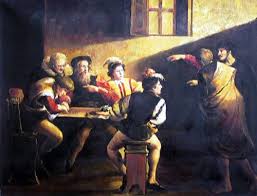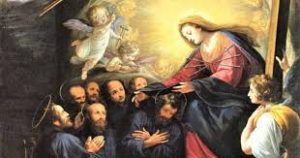HOMILY SATURDAY AFTER ASH WED
Called to Loving Obedience and Holiness:
Optional Memorial of the Founders of the Servite Order
(Is 58:9-14; Ps 86; Lk 5:27-32)
**********************************************
Have you ever felt a call from God to do something more with your life?
The call of Levi today invites us to reconsider God’s call to us, our deeper purpose in life, and how we can respond more fully.
Details are important in the written scriptures. We are informed in this passage that Jesus has just healed a paralyzed man, left the house where he was staying, saw a tax collector named Levi working at his unsavoury trade, and called him.
What we see here is the Messiah at work in a quiet and unassuming way. Jesus as the Messiah had a two-fold mission – to redeem and to sanctify, to forgive and to heal. Having just healed a paralyzed man, Jesus now directly forgives Matthew for gouging the poor, and then invites him to a radical change of life – to follow Jesus into a new vocation. That experience of forgiveness, of God’s unconditional love and mercy incarnate in Jesus, is actually the criteria for leadership in the church – for St. Peter, for St. Paul, and here for Levi.
Bishop Robert Barron, in his comments on this gospel, reminds us that to be a tax collector in Jesus’ time—a Jew collaborating with Rome’s oppression of one’s own people—was to be a contemptible figure.
Jesus gazed at Levi and simply said, “Follow me.” Did Jesus invite Levi because the tax collector merited it? Was Jesus responding to a request from Levi or some longing in the sinner’s heart? Certainly not. Grace, by definition, comes unbidden and without explanation.
 In Caravaggio’s magnificent painting of this scene, Levi, dressed anachronistically in sixteenth-century finery, responds to Jesus’ summons by pointing incredulously to himself and wearing a quizzical expression, as if to say, “Me? You want me?”
In Caravaggio’s magnificent painting of this scene, Levi, dressed anachronistically in sixteenth-century finery, responds to Jesus’ summons by pointing incredulously to himself and wearing a quizzical expression, as if to say, “Me? You want me?”
Just as creation is ex nihilo, so conversion is a new creation, a gracious remaking of a person from the nonbeing of his sin.
Levi’s response is priceless and significant. He gets up, leaves everything and follows Jesus. To appreciate what is happening here, we must put ourselves in Levi’s shoes. He probably already felt some guilt at what he was doing, but the lure of money led him on. Now suddenly, there appeared in his life a person who was understanding, compassionate, not judging, merciful, and also, the one person who could satisfy the deepest yearning of the human heart for meaning, purpose, intimacy – love. And Levi was aware, ready and responded.
His response included an extravagant gesture of gratitude, putting on a great banquet for Jesus, and for his fellow tax collectors and other probably unsavoury characters whom one would hesitate to consider friends. Imagine the table conversation – all of them probably a bit overwhelmed by what was happening to Levi. Yet Jesus is quite at home at this lavish banquet, I think because it was celebrating the transformation of a human being, and perhaps the other tax collectors as well, into a better human being. After all, sin is hamartia, falling short of the person God wants us to be, like an arrow falling short of a target. Levi was suddenly becoming the very best person he could be, and that was cause for celebration.
Isaiah in the first reading is quite clear on what it is we need to be leaving behind to be that better person – blaming others, gossip, selfishness, abusing the Sabbath, etc. He stresses the positive consequences of faith in God and doing God’s will – our light will shine in the dark; our needs to be loved, to belong and to be valued will be met, and we will experience serenity and a wellness in our lives.
For Isaiah, our first call is to holiness: wholeness, purity; love, but above all we are chosen, beloved, set apart. We are to live out of this awareness. Isaiah adds that we are called to live out our vocations above all, caring for the poor and the afflicted, in all the ways that happens in wounded human beings. Catherine Dougherty, founder of the Madonna House Apostolate, stated, “Poverty is the face of Christ, for no one was poorer than he.” Catholic activist Daniel Berrigan liked to say,” Faith is not so much in our minds nor our hearts, as in our seats and feet.”
For its part, Psalm 36 reminds us of what our God is like, and almost prophetically, what Jesus as the Messiah would do in fulfilling this and so many other Old Testament passages – forgive and heal. In the words of the psalmist, “For you, O Lord, are good and forgiving, abounding in steadfast love to all who call on you.” Vocational call is strong in the gospel, and in our lives here

Founders of the Servite Order
Today the church invites us to honor the seven holy founders of the Servite Order, who truly lived the message of today’s readings. One of the earliest orders of mendicants – religious communities who rely solely on charity for support – the Order of Servites was founded in 1240. Between 1225 and 1227, seven young men from the city of Florence joined the Confraternity of the Blessed Virgin, whose members were popularly known as the Praisers. Inspired by visions of Our Lady, they decided to dedicate themselves to lives of prayer and service. In time, they attracted so many visitors that they decided to withdraw to a deserted mountain, where they built a church and hermitage, living a life of extreme austerity. Their bishop prevailed upon them to adopt a rule and accept recruits. This was followed by another vision of Our Lady on April 13, 1240, and a change of name to Servants of Mary, or Servites. The new order grew quickly. One of the early recruits was Peregrine Laziosi, now patron saint of persons with serious illnesses. Of the original seven all but one became priests. Only the lay brother, who lived to be 110, saw the order fully recognized in 1304.
The Eucharist is our encounter with the Risen Lord today, through word and sacrament, forgiving and healing us, and calling us to follow him each in our own unique way. May our celebration today give us the strength to follow our call, and to especially serve God’s people, especially those most in need.



